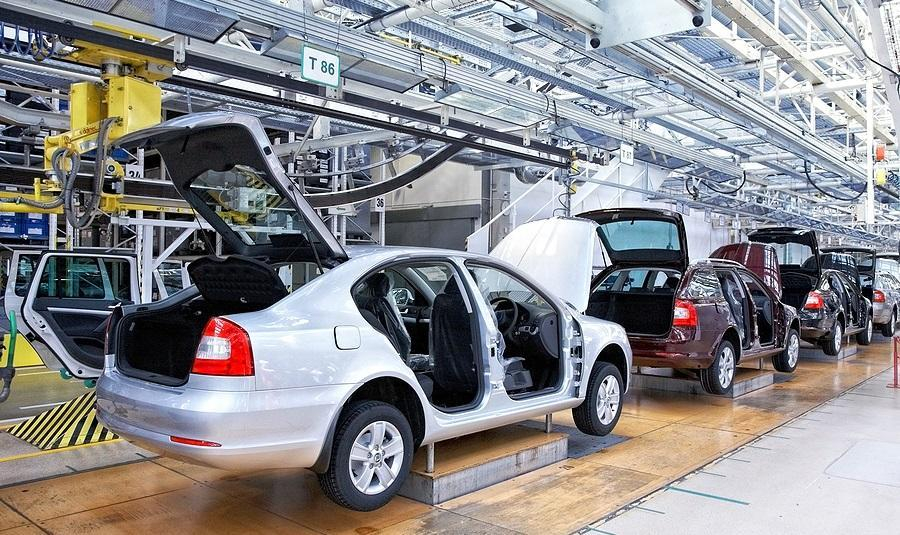Analysis

May 12, 2021
Some Auto Plant Shutdowns Extend into Summer on Chip Shortage
Written by Michael Cowden
Two of the “Big Three” U.S. automakers are extending downtime at their North American plants into the summer months because of the ongoing microchip shortage.
And one, Ford, has upcoming outages at all its U.S. assembly plants besides one in Dearborn, Mich., that makes the F-150 pickup truck, the best-selling vehicle in the United States.
Steel Market Update has the details – plant by plant – below.
![]() General Motors
General Motors
GM’s Fairfax assembly plant in Kansas City, Kan., will remain idled through at least the week of July 5. It has been down since Feb. 8, a company spokesman said.
Fairfax builds the Chevrolet Malibu and Cadillac XT4 cars.
Also in the U.S., GM’s Lansing Grand River assembly plant in Michigan, idled this week, will be down through the week of June 28 – except for production necessary to support the 2022 model year Cadillac Black Wing luxury car, the spokesman said.
Lansing Grand River also makes the Chevrolet Camaro and Cadillac CT4 and CT5 cars.
In Canada, meanwhile, GM’s CAMI assembly plant in Ingersoll, Ontario, will continue to be idled through at least the week of June 28. Like Fairfax, CAMI has been down since Feb. 8. CAMI builds the Equinox compact SUV.
South of the border, GM’s Ramos Arizpe assembly plant in Mexico will be down through the week of May 24. It had been idled since the week of May 3. Ramos builds the Equinox and the Chevrolet Blazer mid-sized SUV.
And GM’s San Luis Potosi plant in Mexico will take downtime the weeks of May 17 and May 24. San Luis Potosi builds the Equinox and the GMC Terrain compact SUV.
“GM continues to leverage every available semiconductor to build and ship our most popular and in-demand products, including full-size trucks and SUVs for our customers,” the company spokesman said. “However, the semiconductor situation continues to remain fluid globally.”
Detroit-based GM is the largest automaker in the United States and among the largest automakers in the world.
Ford
Ford will continue to operate its Dearborn truck plant as usual. But all its other U.S. operations are taking downtime now or have scheduled it in the weeks ahead because of the chip shortage, a company spokeswoman confirmed.
“The global semiconductor shortage continues, presenting challenges to a number of industries – including automakers worldwide – creating additional downtime at our North American plants,” she said.
Ford’s plants in Chicago; Flat Rock, Mich.; Claycomo, Mo.; and Wayne, Mich., will be down the weeks of May 17 and May 24, a company spokeswoman said.
Most of that downtime – except for the Wayne plant – represents the continuation of idlings that had already been implemented.
The Chicago plant makes the Ford Explorer SUV, the Lincoln Aviator SUV, and the Police Interceptor – an SUV for first responders. The Flat Rock facility makes the Ford Mustang and Shelby sports cars. And the Wayne operation makes the Ford Ranger pickup, according to Ford’s website
The Claycomo facility makes the Ford F-150 pickup truck and the Transit cargo van, which is popular with delivery services such as Amazon. It will subsequently operate one shift each on the weeks of May 31 and June 7 to complete builds of the E-Transit van, an electric version of the van of the same name, the spokeswoman said.
Ford’s facility in Avon Lake, Ohio, meanwhile, will produce only medium-duty pickup trucks and certain cabs through the week of May 17. And then it will be down the week of May 24.
Also, Ford’s truck plant in Louisville, Ky., will be down the weeks of June 7 and June 14 so that it can be retooled to make “next-generation” Super Duty trucks.
Stellantis
Stellantis, formerly known as Chrysler, will keep its assembly plant in Belvidere, Ill., down until May 24, a company spokeswoman said.
And the automaker’s plant in Windsor, Ontario, is down this week, she said.
The Belvidere plant makes the Jeep Cherokee SUV and the Windsor facility the Chrysler 300, Dodge Challenger and Dodge Dart cars, per the Stellantis website.
Market Impact
The extended outages come as some market participants report that more spot tons of steel have become available because automotive companies are consuming less.
But others warn that any pause could prove short-lived because automakers are expected to ramp up production quickly when chips become available again.
And most sources continue to report difficultly in finding enough steel to meet strong demand.
“Allocations are killing us,” one SMU survey respondent said.
“At this point we are still running … but we are not many days away from having an issue,” a second said.
“Demand for our products is outstripping the steel mills’ (domestic and import) ability to increase capacities,” a third said.
Steel Market Update’s benchmark hot-rolled coil price, meanwhile, continues to set new records.
SMU’s average hot-rolled coil price is currently $1,540 per ton — or $77 per cwt. That’s a nearly 15% increase from $1,340 per ton a month ago and a roughly 56% increase from $985 per ton at the beginning of the year. Hot-rolled coil lead times meanwhile average 10.81 weeks – an all-time high. That’s up about 37% from 7.87 weeks in early January and more than triple 3.38 weeks a year ago.
By Michael Cowden, Michael@SteelMarketUpdate.com






